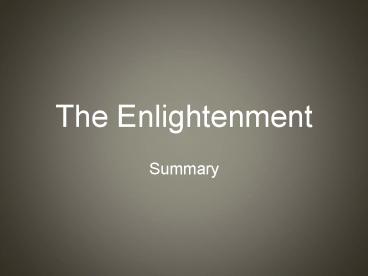The Enlightenment - PowerPoint PPT Presentation
1 / 15
Title:
The Enlightenment
Description:
... Enlightenment Thinkers John Locke Baron de Montesquieu Voltaire Social Contract Thomas Hobbes John Locke Humans are naturally cruel, greedy and selfish. – PowerPoint PPT presentation
Number of Views:69
Avg rating:3.0/5.0
Title: The Enlightenment
1
The Enlightenment
- Summary
2
Objectives
- How did scientific progress promote trust in
human reason? - How did the social contract and separation of
powers affect views on government? - How did new ideas affect society and the economy?
- Identify the philosophies of major Enlightenment
thinkers such as John Locke, Baron de
Montesquieu, Adam Smith.
3
Scientific Revolution Leads to Enlightenment
- 1500-1700 European scientists using reason to
discover laws of nature - Very successful Planetary movements, chemistry,
vaccine for smallpox, etc. - Early 1700s If people used reason to find laws
that governed the physical world, why not use
reason to discover natural laws? - Laws that govern human nature
4
Major Enlightenment Ideas
- Every social, political and economic problem
could be solved through the use of reason - Governments are created to secure an orderly
society (Social Contract)can be any type of
government - Separation of powers
- Republic
- Absolute monarchies
- Limited Monarchies
- All men are created free and equal
- A free market should be allowed to regulate trade
- Promoted education
- Against inhumanities (slave trade, unequal
distributions of property, etc)
5
Enlightenment Thinkers
Voltaire
- John Locke
Baron de Montesquieu
6
Social Contract
Thomas Hobbes
John Locke
- Humans are naturally cruel, greedy and selfish.
- To escape this brutish life people entered into
a social contract. - Believed only an absolute monarchy could keep a
society completely orderly.
- Humans are naturally reasonable, moral and good
- Humans have natural rights life liberty and
property - People form governments to protect natural rights
- Best government was one with limited power
- If a government violates peoples natural rights,
people have the right to overthrow government
7
Separation of Powers
- Baron de Montesquieu Criticized absolute
monarchy and admired British government - Governments should separate their powers between
different groups (legislative, judicial and
executive) - Each branch of government
- should be able to check the other 2
- What government does this sound
- like?
8
Enlightenment and the Economy
- Laissez-Faire allowing business to operate with
little or no government interference - Real wealth comes from productive land not gold
and silver - Supported free trade and opposed tariffs
9
Enlightenment and the Economy
- Adam Smith Free market should be allowed to
regulate business activity - Where there is demand,
- suppliers will seek to meet
- it because there are profits
- and economic rewards to
- be had
10
Supply and Demand
11
Enlightenment Changes Society
- Women Women were not equal and were criticized
for attempting to gain equality - Salons Men and women gather in living rooms to
discuss Enlightenment ideas (chat rooms) - Music Ballets and operas become popular (Bach,
Handel, Mozart) - Art Baroque gives way to rococo art (simple,
elegant and charming) - Literature Novels become popular (Robinson
Cruesoe)
12
Enlightenment Changes Society
- Majority/Lower Class/Peasants Slow to change and
hurt the worst - Serfdom disappears in the west, rises in the east
- All peasants throughout Europe dealt with similar
issues - Forced into military
- Lands could be torn up without compensation by
nobility - Some peasants become eager for change, some
resist change completely
13
REVIEW QUESTIONS
Who believed that people are naturally cruel and
greedy? a) Montesquieu b) Hobbes c) Rousseau d)
Voltaire Which of the following is true of the
physiocrats? a) They rejected laissez faire in
favor of mercantilism. b) They rejected
mercantilism in favor of laissez faire. c) They
rejected both mercantilism and laissez faire. d)
They focused on social reform.
14
REVIEW QUESTIONS
Who believed that people are naturally cruel and
greedy? a) Montesquieu b) Hobbes c) Rousseau d)
Voltaire Which of the following is true of the
physiocrats? a) They rejected laissez faire in
favor of mercantilism. b) They rejected
mercantilism in favor of laissez faire. c) They
rejected both mercantilism and laissez faire. d)
They focused on social reform.
15
Major Enlightenment Ideas for Society
- Detested the slave trade and slavery
- Deplored religious prejudice
- Defended freedom of speech
- Attacked divine right theory
- Urged education for all
- Hated unequal distribution of property
- Believed governments should be freely elected
- Womens first duty was to her family































